 722,357 index records of students from various schools in Cheshire, England, between the years 1796 and 1909. Records typically include the name of the individual, date of birth, residence, attendance years and place of school, and the names of the parents.
722,357 index records of students from various schools in Cheshire, England, between the years 1796 and 1909. Records typically include the name of the individual, date of birth, residence, attendance years and place of school, and the names of the parents.
The unattributed collection appears to be via the FamilySearch collection, Cheshire, School Records, 1796-1950, sourced from the Record Office, Chester.
Eclipse Weather Forecast
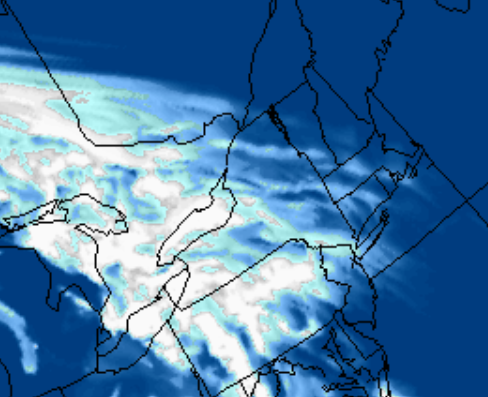 It will be touch and go as to how good the weather conditions will be for eclipse viewing on Monday afternoon.
It will be touch and go as to how good the weather conditions will be for eclipse viewing on Monday afternoon.
QUICK UPDATE: As of Sunday morning, forecasts are less optimistic for eclipse viewing.
As of Saturday evening the Environment Canada forecast for Monday is: Niagara Falls – sun and clouds; Toronto and Belleville – cloudy; Kingston, Brockville, Cornwall, and Ottawa – a mix of sun and clouds; and Montreal – sunny.
The Weather Network is less optimistic.
“across eastern Ontario, with mostly cloudy skies with occasional sunny breaks. It’s not an ideal location to take in the eclipse if you’re looking for an unobstructed view of totality, but it’s still possible a break could emerge during that time.”
The US Weather Bureau forecast for Ogdensburg is mainly sunny.
Looking at the various forecast models the predictions are mixed. We’re looking at a warm front approaching heralded by a shield of cirrus cloud. Eclipse viewing will depend on how quickly the cloud arrives, Even if it’s cloudy expect the darkening to be impressive.
Sunday Sundries
Miscellaneous items I found of interest during the week.
From 2007, with a well respected Ontario genealogist. Lots of ads!
Industrial Revolution began in 17th not 18th century
Ancestry updated Hampshire, England, Wills and Probates, 1398-1858 to hold 95,240 records
OCR PDFs and Images Directly in your Browser
http://tools.simonwillison.net/ocr
On Kahneman and Complexity: Reality is complicated. Our thinking should reflect that, by Dan Gardner
Thanks to this week’s contributors: Anonymous, Barbara May Di Mambro, Bonnie, Brenda Turner, Bryan Cook, Friday’s Family History Finds, gail benjafield, Irene, Ken McKinlay, M.C. Moran, Teresa, Unknown.

OnLand from a Genealogy Perspective
If you’re digging into Ontario land property records or perhaps need s refresher, OGS Oxford County Branch hosts a presentation, OnLand from a Genealogy Perspective, by Ken McKinlay on Monday, 8 April.
Advertised as at the intermediate to advanced level, the meeting gets going at 7:00 pm on Zoom.
Register for this free meeting at:
https://us02web.zoom.us/meeting/register/tZAsde-urTIoHtarLZl140o_n6gwvJOqztSq
Ancestry 1890 London Maps Online – disappointing
The 24 London, England, Stanfords London Maps, 1890, Ancestry has made available are informative and colourful; they were originally six inches to the mile.
Good luck finding a place of interest. The individual maps are shown on a film strip. It’s as if the collection was dumped online. There is no index, no indication of the order, and not even a linked overview map. Ancestry can do much better.
Why so many William Henry’s?
If you look at your genealogy database for given names in England and Wales during the 19th century, you’ll notice that Mary, John, and William were the most common names. Mary was the most popular girl’s name. John was overtaken by William in 1840, as shown in table 3 in A New Account of Personalization and Effective Communication.
According to the FreeBMD compilation of 1840 birth registrations, the top ten names for boys were William, John, Thomas, James, George, Henry, Joseph, Charles, Robert, Edward, and Richard. I find it intriguing that my two-times-great-grandfather, William Henry Northwood, born in 1840, had a two-given name combination that often appeared during that time. I wondered if it was just an illusion.
Based on the 1840 FreeBMD birth compilation, here’s the top of the order of those more frequent boys’ names in combination:
Given Names, Count
– William Henry, 2111
– John William, 811
– William John, 650
– John Thomas, 634
– John Henry, 600
– George Henry, 563
– William Thomas, 542
– George William, 524
– William James, 513
– Thomas William, 421
While William is the top first name, Henry tops the second name list. It’s not surprising that William Henry ranked highly.
It wasn’t just in 1840; William Henry peaked as a combination in 1876 with 6,772 births registered, outranking William John and John William.
What made William Henry a popular choice? I don’t know and would love to hear your ideas.
Findmypast Weekly Update
 This week, there are some out-of-the-ordinary additions to the FMP collection that are particularly interesting for those with 20th-century Coventry ancestry and, surprisingly, beyond.
This week, there are some out-of-the-ordinary additions to the FMP collection that are particularly interesting for those with 20th-century Coventry ancestry and, surprisingly, beyond.
Warwickshire, Coventry, Vehicle Registrations 1921-1944
Through these records, a search produces first name(s), last name, year, place, and vehicle registration plate. There’s information later than 1944. The linked images give the complete address, which may be far from Coventry, and information about the vehicle. Scroll side to side to ensure you found all the information.
FMP profiles the story of Sir William Lyons, co-founder of the Swallow Sidecar Company, whose brand transformed into Jaguar after the Second World War.
Warwickshire, Coventry, Company Directories and Publications 1908-1966
Over 20,000 pages from seven publication titles that can help you discover what it was like to live and work in Coventry. The two major ones are:
The Loudspeaker, 15 volumes, 1924-1966: 1924-1961
The works magazine of the Peel-Conner/G.E.C. Telephone Factories, Coventry. Includes biographical studies of staff, sports and social events, appointments and retirements, a Ladies Page, jokes, Children’s Corner, cartoons, organizational reviews, letters, trade adverts, staff weddings etc etc.,
Standard Car Review, 12 volumes, 1931-1950: 1908-1920
The works magazine of Rudge-Whitworth, Coventry, bicycle and motorcycle manufacturers. The origins of Rudge go back as far as 1869 at Wolverhampton, removing to Coventry some ten years later. These volumes include company history, staff interviews, presentations and long service awards, social events, and incredible coverage of the Rudge staff who served in the Great War.
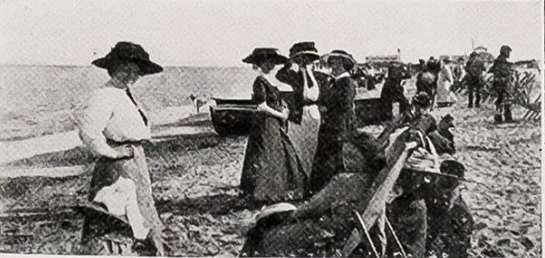 I was interested to read a report of a 1910 works outing to Great Yarmouth, a long day starting out by train at 5:50 am, arriving back in Coventry at 2 am. It includes photos of women in long dresses on the beach.
I was interested to read a report of a 1910 works outing to Great Yarmouth, a long day starting out by train at 5:50 am, arriving back in Coventry at 2 am. It includes photos of women in long dresses on the beach.
British Placename Mapper
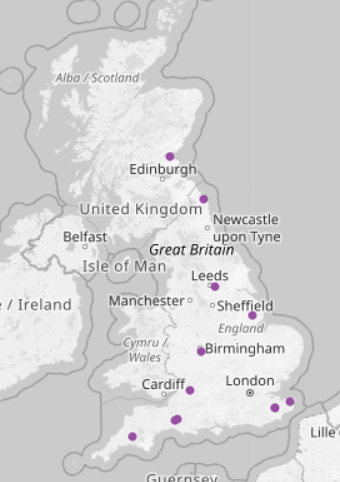 Try this website, which plots British (England, Scotland, and Wales) place names that match certain search terms on a map.
Try this website, which plots British (England, Scotland, and Wales) place names that match certain search terms on a map.
Developed by Robin Wilson, it’s based on OS Open Names.
This map is trying my LUCK – found anywhere in the name. Only three places include BALLY, common in Ireland, and several where the only locations in Wales are in Pembrokeshire, little England beyond Wales.
Canada is found in two places.
“I am none the wiser, but I am much better informed.”
A metre of snow in April
There’s precedent.
1885 saw a major April snow event in Ottawa. 30.5 cm reported on the 2nd, 30.6 cm on the 3rd and another 30.5 cm on the 4th. Over 1 metre in total in 52 hours. It tapered off to 6.4 cm the following day, and 50.8 mm of rain on the 6th.
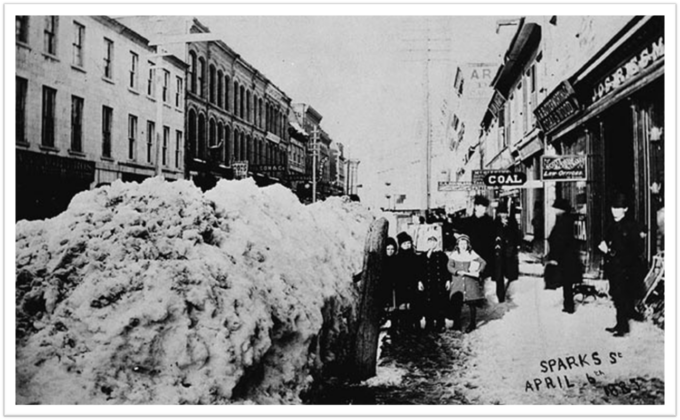
Sparks Street, 6 April 1885, Samuel J. Jarvis/Library and Archives Canada, C-002186
There’s remarkably little coverage in the Ottawa Citizen. Easter Sunday was 5 April and newspapers were preoccupied with the Riel uprising. There was mention of employing extra staff to clear roofs at Lansdowne Park and cancellation of events as guests could not get into the city.
The Ottawa Citizen ran this poem referring to astrometeorologist Ezekiel Stone Wiggins.
NOT WEATHER WISE, MUCH OTHERWISE.
BY A DRIFT-BOUND PASSENGER.
(For The Citizen.)
Heavy storm began at Ottawa 9 am. April 2; still raging, 6 pm, Apnl 3; snowfall, 24 Inches ; by far the greatest of the year.
N.B.—No warning from Wiggine.
O Wiggins, O! delusive prophet Wiggins !
Though your very dubious fame has spread
abroad,
The behaviour of the weather in those diggins (sic)
Plainly tells us your pretensions are a fraud.
That rude March would have his equinoctial bluster
It was safe for any almanac to say ;
But if special storm predictions would pass muster,
They must specify the place and name the day.
Scaring honest peorle living by the ocean,
Threatening tempests which neglected to appear ;
You malcted (?) sailors, chiefly Nova Scotia,
A badly needed fortnight’s wage last year.
And now, Wiggins, what on earth have you been doing,
Say where’s your vaunted skill in Zadkeil lore,
While ‘neath your very nose a storm was brewing,
The like of which we’ve rarely seen betore.
Yet not a whisper from our Mahdi prophet!
Our oracle of Ottawa was dumb!
If still you stride the tripod, pray get off it —
Collapse, subside, come down, ah, Wiggins, come.
We railway travellers had from you no warning.
Driifts bar our progress, engines shrick in vain ;
Here we must shiver tiil to-morrow morning—
sweet our revenge if you were on our train.
Too long imposed on women of both sexes,
ln time the errant humbug to explode,
Which reasonable people often vexes.
You gales foretell— Pshaw, Wiggins, you “be blowed “!
Two feet of snow-fall! Wild nor’-easter blowing ! .
The third of April. Storms defy all rule.
No hint from Wiggins. Needs there further showing : ;
That weather wisdom makes its April fools?
Note: Significantly less snow was recorded on those April 1885 days at the Experimental Farm station. Snowfall is notoriously difficult to quantify.
Archives Awareness and LAC
2-5 April is Archives Awareness Week in Ontario. This year, the Archives Association of Ontario selected “Access your Archives” as its theme, asking its members to:
- Tell us about a unique outreach initiative your archive has been working on.
- How do you provide access to your archives collection?
- In what ways do you make your collection accessible or hope to?
- What challenges do archives face in making records accessible while respecting users and donors?
- What archival process or specific record in your collection keeps you up at night?
- Developments in new networks and collaborations.
I’m sure AAO is hoping to profile good news stories. Good things are happening in various corners of the province we don’t usually hear about, and I hope to read about them.
There’s the other side of the story. Allan Greer, a professor emeritus of history at McGill University, posted an opinion piece on the Active History blog worth reading — LAC: The Scandal of the Archives.
The part that resonated most with me as a user of digitized resources from LAC was, “The problem is not with digitization per se, but with the chaotic way in which LAC has dumped their collections onto the internet.” Digitised microfilm is made available through Canadiana Heritage and is divorced from any finding aid. Greer concludes:
Archives don’t simply store and conserve documents; they structure and organize them, carefully recording the provenance of government records, collections of private papers, films, recordings, images, etc. LAC has always been very good at this and generations of archivists built up an infrastructure of guides and finding aids, but instead of using these resources to curate their online collections, the archives seem determined to hide the results of their past efforts from the eyes of researchers.
Cancer Risk via DNA Testing
The National Health Service is offering free testing for faults on the genes BRCA1 and BRCA2, which are associated with a higher risk of some forms of cancer, to anyone in England with at least one Jewish grandparent.
According to jewishbrca.org, whereas women in the general population have an 11.5% chance of developing breast cancer, for those with one (or more) Jewish grandparents, the chances are 65-79% with the BRCA1 mutation, and 61-77% with the BRCA2 mutation.
For men, chances of prostate cancer, which are 0.1% for men at large, rise to 21-35% for the BRCA2 mutation.
WDYTYA Magazine: April 2024
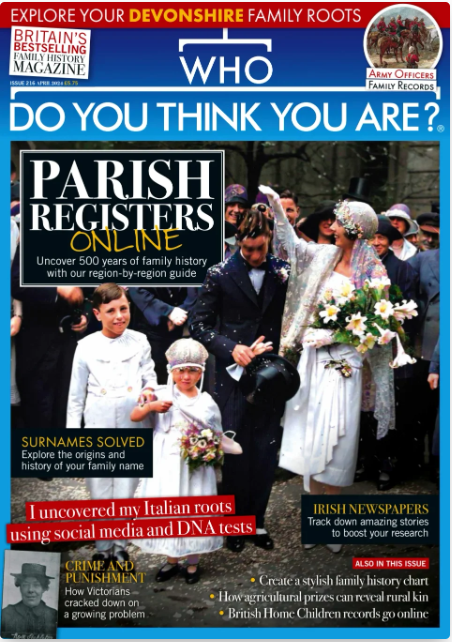 Here are the feature articles from the new issue, and selected highlights.
Here are the feature articles from the new issue, and selected highlights.
Parish Registers
Jonathan Scott unveils his region-by-region guide to the essential websites that can help you uncover 500 years of family history. It’s mostly an update on what’s available on the usual suspects: Ancestry, Findmypast, TheGenealogist, FamilySearch, freereg, and local sites.
Agricultural Prizes
Nina Hoole explains what the prizes awarded at agricultural shows can reveal about our ancestors. I identified folks in my family tree who moved from north to south Norfolk though prize announcements in the British Newspaper Archive, available through Findmypast.
Crime & Punishment
In “The Long Arm of the Law”, Angela Buckley investigates how the Victorians cracked down on a growing problem. Again, in my experience newspapers are the best resource for finding those involved in criminal cases.
Irish Newspapers
Genealogist Nicola Morris shares her expert advice for
using Irish newspapers to boost your research
Best Websites
Jonathan Scott picks the best online resources to
explore the origins and history of your family name,
including digital dictionaries and one-name studies.
British Army Officers
In the Masterclass series, Phil Tomaselli explains how to research British Army officers’ families as a major release arrives on Ancestry.
Treemily.com
Nick Peers reveals how to create a stylish family history
chart using the website, and reveals some issues
Devonshire Archives
In the Around Britain series, Jonathan Scott explains how the collections held in archives in Exeter, Plymouth and Barnstaple can help your research.
There’s lots more, all available free if your public library provides online access.

